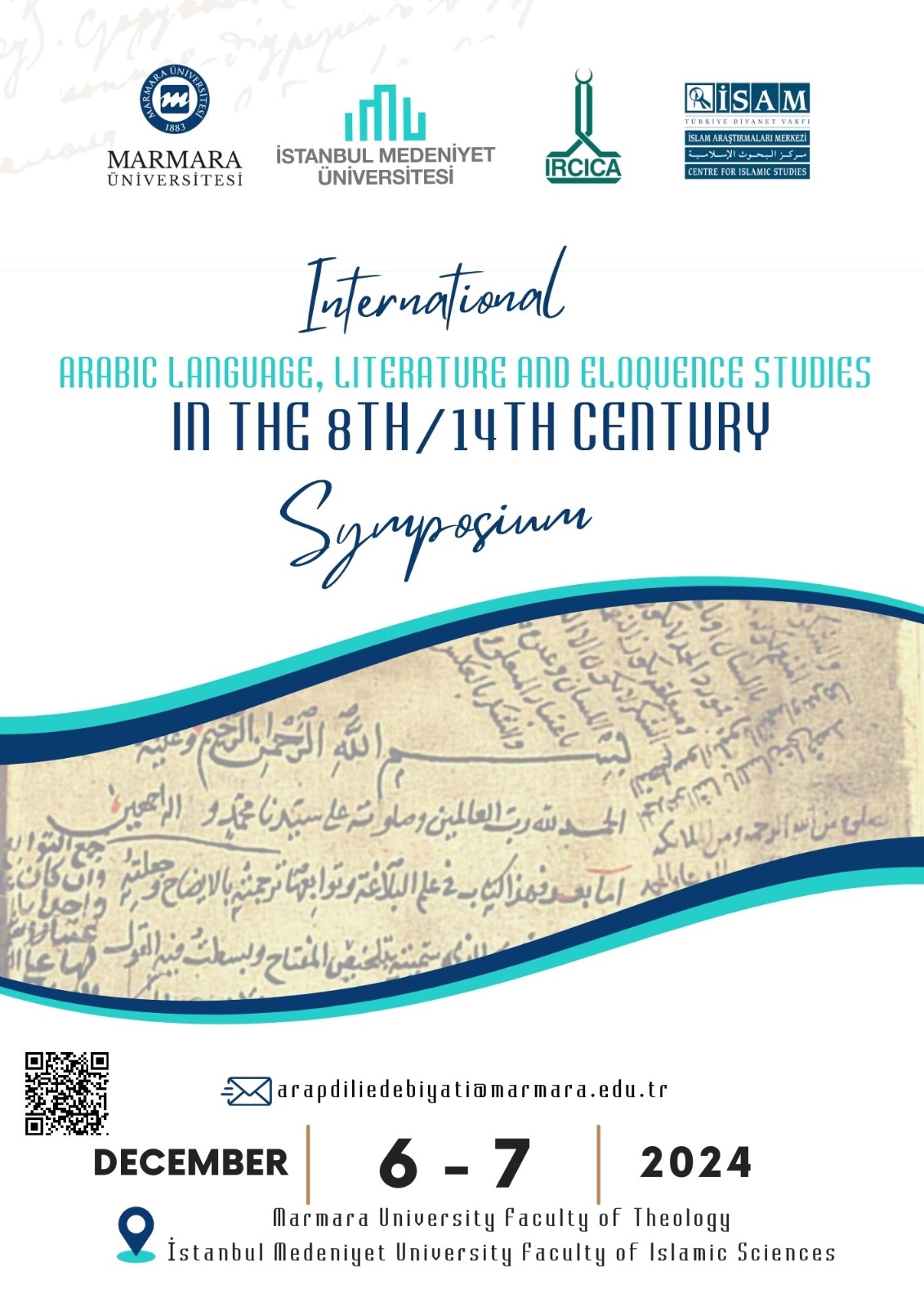
Call for Papers:
Studies of Arabic Language, Literature and Rhetoric in the 8/14th Century
Symposium at Marmara University Faculty of Theology,
December 6-7, 2024
Dear Colleagues,
In collaboration with the Department of Arabic Language and Rhetoric at Marmara University Faculty of Theology, the Department of Arabic Language and Rhetoric at Istanbul Medeniyet University Faculty of Islamic Sciences and Research Center For Islamic History, Art and Culture (IRCICA), we are organizing a symposium titled “Studies of Arabic Language, Literature and Rhetoric in the 8/14th Century”. In this symposium, we aim to take a close look at the authors who composed works in this century, their works, and the theories and perspectives prevalent in this period. In doing so, we will focus on Anatolia and the regions that influenced it such as the Damascus and Egypt centered Mamluks, as well as the Turkestan and Iran area. The importance of presentations focusing on authors, texts, or theories will be assessed based on their influence on Ottoman intellectual history. Addressing the preliminary century leading up to the Ottoman period, this symposium is the first of a series of symposiums on Arabic language, rhetoric, and literature in the Ottoman period. For this reason, papers that tackle figures or the works and thoughts of figures who had an influence on Ottoman regions will be given priority.
8/14th century in Islamic civilization hosts numerous scholars and littérateurs who have penned significant works on ‘ilm-i adab, reflecting the scholarly, literary, and intellectual heritage of this period. Undoubtedly the effect of these scholars and their works went beyond their time. Understanding the later emergence of the scientific and literary tradition in Anatolia and pinpointing the primary sources of the Ottoman scholars and littérateurs can only be possible by tracing these effects. For various reasons, people traveled to the centers of sciences and literature such as Khorasan, Samarkand, Herat, Damascus, Tabriz, and Cairo and the scholarly exchange as a result of these travels harbored an Islamic civilization that was to be centered in Anatolia in the following centuries. The works that were written on ‘ilm-i adab, from lexicons to books of grammar, morphology, rhetoric, literature, wad’, etc. would become the primary references of the next era.
In recent years scholars have been addressing this period by focusing on authors, works, thoughts, etc. However, the majority of these studies neglect the wider systematics of ‘ilm-i adab, and its chronological evolution and lack critical investigation of it. Hence such fragmental studies that have been put forth so far are insufficient in drawing a fuller picture of the period and reaching solid findings. For this reason, in 2022 an introductory workshop titled ‘Studies of Arabic language, literature and rhetoric in the 8/14th century’ was organized to address the intellectual evolution of the Ottoman period. The symposium, which is considered a continuation of the aforementioned workshop and the first of a series of symposiums and workshops that will address the following periods, will investigate the period in question from a wider perspective and make it possible for specialized scholars to come together and present and discuss their works.
Our primary aim is to center on the scholars who flourished in the 8/14th century Anatolia and parts of the Muslim world that were in contact with Anatolia in the fields of language, literature, and rhetoric, as well as their works and the issues that were raised. In summary, our purpose is to set forth the intellectual accumulation of knowledge of this era. For this reason, works of tabaqāt (biography), kulliyyāt (compendiums), barnāmaj (lists of works studied), etc. are equally significant.
Furthermore, this period is very rich in terms of poetry and artistic prose. One of the expected outcomes of this symposium is to outline this richness identifying its contribution to prior Arabic literature works and its impact on subsequent developments. The art of badīʿ and the style of poetry known as badīʿiyyāt are also among the focuses of the symposium.
Additionally, among the focuses of this symposium are scholars who have flourished in Anatolia such as Chandarlı Kara Khalil (d. 789/1387), Camâladdin al-Aksarâyî (d. 791/1389), Ahmad al-Niksârî (fl.761/1360) and their works.
Language of the Symposium: Turkish, English and Arabic
Minimum word number for abstracts: 250 words
Deadline for the submission of abstracts: June 3, 2024
Announcement of the accepted abstracts: June 24, 2024
Final Delivery of the Full Text of the Papers: September 20, 2024
Symposium Date: December 6-7, 2024
Location: Marmara University Faculty of Theology / İstanbul Medeniyet University Faculty of Islamic Sciences
The symposium will publish the selected papers as a book.
Contact email: arapdiliedebiyati@marmara.edu.tr
Web: http://arapdiliedebiyati.etkinlik.marmara.edu.tr/
Address:
Marmara Üniversitesi İlahiyat Fakültesi Altunizade Mahir İz cad. 34662 Üsküdar /İSTANBUL
İstanbul Medeniyet Üniversitesi İslami İlimler Fakültesi İstanbul Medeniyet Üniversitesi Kuzey Yerleşkesi E Blok, Ünalan Mah. Ünalan Sok. D-100 Karayolu Yanyol 34700 Üsküdar/İstanbul
Topics of the Symposium:
Figures/Scholars/Littérateurs
14th century figures who lived in or influenced Anatolia, modern-day Turkestan, and Iran or, the Damascus and Egypt centered Mamluks. Especially:
- Chandarlı Kara Khalil (d. 789/1387)
- Abû Hayyân al-Andalusî (d. 745/1344)
- İbn Nubâta al-Mısrî (d. 768/1366)
- Camâladdîn Aksarâyî (d. 791/1388-89 [?])
- Mahmad al-Kaysarî (fl.761/1360)
- Ahmad al-Niksârî (fl.761/1360)
- Shamsaddin al-Konevî (d. 788/1386)
- Alâaddin Aswad (d. 800/1397) …
State of the field /Contemporary scholarship
- Literature
-Poetry (badīʿiyyāt)
-Prose (Maqāmāt, ikhwāniyyāt, nasihatnâme, riwāyāt, akhbār, nawādir, mizāh, mathal, hikemiyyāt…)
- Rhetoric, Balāgha
-Texts, commentaries, glosses, abridgements
-Commentaries of Telhîs
-ʿilm al-badīʿ
- Works of grammar, morphology, and lexicography
- tabaqāt (biography), and barnāmaj (lists of works studied works)
- Works on wad’ …
- Schools of thought
-Schools of balāgha
-Schools of nahw …
- Issues
-Manuscripts at the libraries
- İcâzetnâme
- Change in poetry …
- Regions
-Anatolia
-Turkestan, Iran
-Mamluks centered at Cairo and Damascus ...
Bu sayfa Arap Dili ve Belagatı Anabilim Dalı Etkinlikleri tarafından en son 01.07.2024 16:00:23 tarihinde güncellenmiştir.
